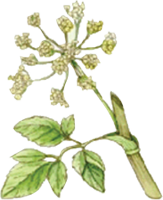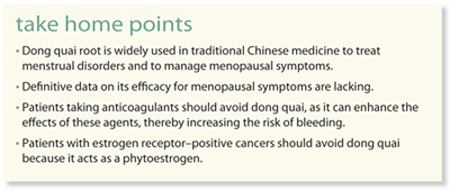Dong Quai (Angelica sinensis)
Dong quai is a perennial herb native to China, Japan and Korea; its root has been used for thousands of years as medicine.

ALSO KNOWN AS: Chinese angelica, dang gui, tang kuei, tan kue.
BACKGROUND: Dong quai is a perennial herb native to China, Japan and Korea; its root has been used for thousands of years as medicine. Often combined with other herbs in compound formulations, dong quai is still widely used in traditional Chinese medicine to treat menstrual and menopausal disorders, and to improve circulation. Dong quai is available as a dietary supplement in both tablet and powder form. It is promoted as a "woman's herb."
RESEARCH: In vitro studies indicate that dong quai has anti-tumor,[1] anti-tuberculosis,[2] and neuroprotective[3] effects. In animal models, dong quai demonstrated hematopoietic properties[4] and protective effects against cyclophosphamide-induced toxicity,[5] doxorubicin-induced cardiotoxicity,[6] and radiation-induced pneumonitis.[7] A growth factor isolated from this herb has been shown to promote wound healing and regenerate bone tissue.[8] These effects have not been evaluated in humans.
Dong quai also exhibits estrogenic activity[9] and stimulates proliferation of MCF-7 cells, a human breast cancer cell line.[10] However, clinical trial data regarding the effects of dong quai on menopausal symptoms are inconclusive.[11-13] Dong quai did not alleviate vasomotor symptoms in prostate cancer patients receiving androgen deprivation therapy.[14] Further research is needed to evaluate the efficacy of this agent.
ADVERSE REACTIONS: Reported adverse events include bloating, loss of appetite,[15] diarrhea, photosensitivity,[16] and gynecomastia.[17]
HERB-DRUG INTERACTIONS: Dong quai can potentiate the effects of anticoagulants because of its coumarin content.[18]

For additional information, visit the Memorial Sloan-Kettering Cancer Center Integrative Medicine Service website, “About Herbs,” at http://www.mskcc.org/AboutHerbs.
References:
REFERENCES
1. Lee WH, Jin JS, Tsai WC, et al. Biological inhibitory effects of the Chinese herb danggui on brain astrocytoma. Pathobiology. 2006;73:141-8.
2. Deng S, Wang Y, Inui T, et al. Anti-TB polyynes from the roots of Angelica sinensis. Phytother Res. 2008;22:878-82.
3. Huang SH, Lin CM, Chiang BH. Protective effects of Angelica sinensis extract on amyloid beta-peptide-induced neurotoxicity. Phytomedicine. 2008;15:710-21.
4. Liu PJ, Hsieh WT, Huang SH, et al. Hematopoietic effect of water-soluble polysaccharides from Angelica sinensis on mice with acute blood loss. Exp Hematol. 2010;38:437-45.
5. Hui MK, Wu WK, Shin VY, et al. Polysaccharides from the root of Angelica sinensis protect bone marrow and gastrointestinal tissues against the cytotoxicity of cyclophosphamide in mice. Int J Med Sci. 2006;3:1-6.
6. Xin YF, Zhou GL, Shen M, et al. Angelica sinensis: a novel adjunct to prevent doxorubicin-induced chronic cardiotoxicity. Basic Clin Pharmacol Toxicol. 2007;101:421-6.
7. Xie CH, Zhang MS, Zhou YF, et al. Chinese medicine Angelica sinensis suppresses radiation-induced expression of TNF-alpha and TGF-beta1 in mice. Oncol Rep. 2006;15:1429-36.
8. Zhao H, Alexeev A, Sharma V, et al. Effect of SBD.4A-a defined multicomponent preparation of Angelica sinensis-in periodontal regeneration models. Phytother Res. 2008;22:923-8.
9. Liu J, Burdette JE, Xu H, et al. Evaluation of estrogenic activity of plant extracts for the potential treatment of menopausal symptoms. J Agric Food Chem. 2001;49:2472-9.
10. Amato P, Christophe S, Mellon PL. Estrogenic activity of herbs commonly used as remedies for menopausal symptoms. Menopause. 2002;9:145-50.
11. Cheema D, Coomarasamy A, El-Toukhy T. Non-hormonal therapy of post-menopausal vasomotor symptoms: a structured evidence-based review. Arch Gynecol Obstet. 2007;276:463-9.
12. Rotem C, Kaplan B. Phyto-Female Complex for the relief of hot flushes, night sweats and quality of sleep: randomized, controlled, double-blind pilot study. Gynecol Endocrinol. 2007;23:117-22.
13. Wong VC, Lim CE, Luo X, Wong WS. Current alternative and complementary therapies used in menopause. Gynecol Endocrinol. 2009;25:166-74.
14. Al-Bareeq RJ, Ray AA, Nott L, et al. Dong Quai (angelica sinensis) in the treatment of hot flashes for men on androgen deprivation therapy: results of a randomized double-blind placebo controlled trial. Can Urol Assoc J. 2010;4:49-53.
15. Foster S, Tyler VE. Tyler's honest herbal: a sensible guide to the use of herbs and related remedies. 3rd ed. New York: Haworth Herbal Press; 1993.
16. DerMarderosian A. The review of natural products. St. Louis: Facts and Comparisons; 1999.
17. Goh SY, Loh KC. Gynaecomastia and the herbal tonic "Dong Quai". Singapore Med J. 2001;42:115-6.
18. Page RL 2nd, Lawrence JD. Potentiation of warfarin by dong quai. Pharmacother. 1999;19:870-6.
Prolaris in Practice: Guiding ADT Benefits, Clinical Application, and Expert Insights From ACRO 2025
April 15th 2025Steven E. Finkelstein, MD, DABR, FACRO discuses how Prolaris distinguishes itself from other genomic biomarker platforms by providing uniquely actionable clinical information that quantifies the absolute benefit of androgen deprivation therapy when added to radiation therapy, offering clinicians a more precise tool for personalizing prostate cancer treatment strategies.